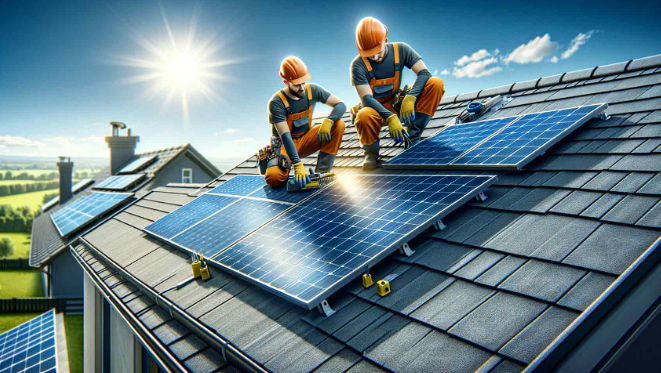Deciding to switch to renewable energy through solar power is a significant step towards a greener future. But how much does it cost?
The answer is not as straightforward as one might hope. Your final solar installation quotation can vary greatly, influenced by several key factors.
This blog aims to demystify the process, helping you understand what drives the cost of going solar. From the size of your home to the type of solar panels you choose, we’ll explore the top elements that impact your solar installation quote.
Size of Your Home
The size of your home plays a critical role in determining your solar system size and the cost of installation. Larger homes need more energy to power them. This leads to the need for a larger solar panel setup.
The bigger your home, the more panels you’ll need to meet your energy demands. Assessing your home’s size is a crucial step. It ensures that your solar system size is matched to your demands.
Energy Consumption
Your household’s energy consumption influences your solar system’s requirements. The more electricity your home uses, the more the solar system needs to cover your needs.
Understanding your monthly electricity usage is critical. It helps tailor a solar solution that aligns with your energy demands. High-consumption items can increase your energy requirements. It includes:
- air conditioning units
- heaters
- pools
Energy-saving practices can reduce your system’s size and cost. It’s not just about the quantity of energy used but also when it’s used.
Homes with peak energy use during sunlight hours may enjoy more solar power. Assessing your energy consumption patterns is a vital step in customizing your solar installation.
Solar Panel Efficiency
Solar panel efficiency is a key determinant of how much solar power your system can produce. It refers to the percentage of sunlight that panels can convert into usable electricity.
Higher-efficiency panels yield more energy, even in limited spaces. It means you can generate more power without needing a vast rooftop. Types of panels vary, with monocrystalline being the most efficient, albeit often at a higher price.
Polycrystalline panels, while less efficient, can be more cost-effective. Selecting high-efficiency panels can impact your energy production.
It reduces your need for space and cuts costs in the long run. It’s crucial to balance efficiency and cost to fit your energy needs and budget.
Location
The location of your home affects your solar system’s efficiency and the quote. Areas with higher sunlight exposure naturally ease greater energy production.
Homes situated in regions known for their abundant sunshine will harness more power. It makes solar installation more cost-effective over time.
Properties in less sunny locations may need additional panels. It is to achieve the same energy output, increasing the cost.
Sunlight exposure is about geographic location. It also involves potential shading from trees or buildings.
A home with clear, unobstructed access to sunlight will yield more energy. So, evaluating the specific location and sunlight exposure of your property is vital for an accurate solar installation estimate.
Incentives and Rebates
Financial incentives and rebates can lower the cost of installing a solar energy system. Many governments offer incentives to encourage renewable energy adoption. These government incentives can take various forms, such as:
- tax credits
- rebates
- feed-in tariffs
They’re designed to make solar installations more affordable and attractive to homeowners. The availability and amount of these incentives can vary depending on your geographic location and local policies.
It’s crucial to research and apply for any applicable incentives in your area. By taking advantage of these financial benefits, you can reduce the initial investment required for solar power, making it a more cost-effective solution for your energy needs. To ensure optimal results, consider partnering with a reliable solar panel company for hire.
Type of Mounting
The type of mounting system used for your solar panels plays a pivotal role in the installation cost and efficiency. Ground mounts and rooftop mounts are the two most common types.
Rooftop mounts are popular due to their space efficiency. They use your existing roof space. Ground mounts require additional space but can be oriented for maximum sunlight exposure.
The choice impacts labor and material costs. Rooftop installations might need structural reinforcements.
Ground mounts may need extensive site preparation. The mounting type affects the panels’ ability to capture sunlight. Proper alignment enhances energy production. Thus, selecting the right mounting system is crucial for optimizing your solar power setup.
Battery Storage
Battery storage is a pivotal component in maximizing the use of your solar power system. It allows for the storage of excess energy produced during peak sunlight hours. This stored energy can be used when the sun isn’t shining, such as during the evening or on cloudy days.
Having a battery storage system ensures a constant energy supply. It increases your independence from the grid. The capacity of the battery dictates how much energy can be stored.
Larger batteries hold more energy, providing more backup power. Battery technology impacts efficiency and lifespan. Lithium-ion batteries are popular for their high efficiency and long service life.
Yet, the cost of battery storage systems varies, influenced by capacity and technology. Investing in a suitable battery storage system enhances your solar installation’s effectiveness. It makes renewable energy more reliable.
Maintenance and Repairs
Maintaining your solar power system is crucial for its long-term efficiency and reliability. Solar panels require minimal maintenance.
Regular cleaning to remove dirt, leaves, or snow ensures maximum sunlight absorption. Inspections can identify and fix issues early, such as loose mountings or damaged panels. Repairs may be needed if performance drops.
Component warranties often cover such repairs. Inverter maintenance is also vital, as it converts solar energy into usable electricity. Inverter issues can affect your system’s output.
Budgeting for occasional maintenance and repairs is wise. Proper care extends your system’s lifespan, maximizing its value and sustainability.
Discover the Elements Affecting the Solar Installation Quotation
Understanding the factors that influence your solar installation quotation is crucial. The size of your home, energy consumption, solar panel efficiency, location, available incentives, the type of mounting, battery storage needs, and maintenance requirements all play pivotal roles.
Each component should be carefully considered to ensure you receive a fair and accurate quotation. By familiarizing yourself with these aspects, you can make informed decisions towards a more sustainable future.
A well-planned solar power system contributes to environmental conservation. It leads to significant savings over time.
Did you find this article helpful? If so, check out the rest of our site for more informative content.

Doris Pollard, a mesmerizing wordsmith and experienced blogger, crafts narratives that carry readers into unexplored realms. Infused with insightful perspectives and vibrant storytelling, Doris’s mastery of language captivates both hearts and minds, making an enduring impression on the literary landscape.

